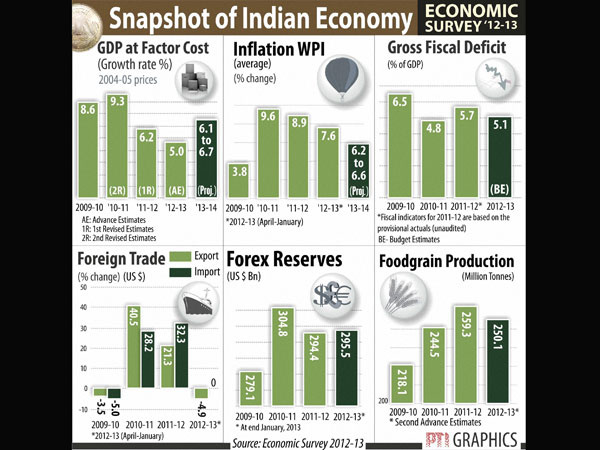
Politicians have always battered India's economy, they still do
The Indian story has a paradox. While politically, the founding fathers followed a western model, economically, they chose to look to the east. The first four decades since Independence went on the mixed lines and took us to the brink in 1991 when there was no other option but to go for a drastic revision of the economic policy. It was a compulsion to take the step rather than a fairy tale authored by the Narasimha Rao-Manmohan Singh duo at that time.
Twenty-two years after, the Indian story is about to be running on the same track towards the abyss. It is a reflection of our failure to manage a promising economy and help it achieve its full potential and it is pathetic to learn that the politicians, particularly the rulers of the day, have turned a blind eye towards an impending disaster and busy assuring themselves that all is well.

The separation of the politics from economics in the formative years of the Indian economy is making the nation paying dearly today. Since the economy was allowed to be stifled under a welfare state system since 1947, it eventually became a secondary pawn in the hands of the populist politicians, who in the name of welfare, maltreated the economy.
The Congress isn't the only one guilty of undermining all things economic, but it deserves a bigger share of the criticism for it has ruled the nation for most part of the post-Independence era.
No consensus on decision-making
The
ruling
UPA
led
by
the
Congress
is
a
mess
not
only
because
it
has
failed
to
deliver
on
popular
expectations,
but
because
it
has
failed
to
arrive
at
a
consensus
on
key
issues.
In
terms
of
the
economy,
the
Congress
looks
to
be
sharply
divided
on
how
to
go
about
populism
and
austerity.
Most
populist
and
left-leaning
leaders
believe
the
politics
of
doling
out
will
keep
on
doing
the
trick
at
the
time
of
the
elections
while
the
pro-market
brains
in
the
government
are
left
worried.
But
the
latter
have
inadequate
influence
to
force
things,
one
suspect.
The
government
looks
to
be
depending
too
much
on
the
Reserve
Bank
of
India.
Manufacturing sector in a bad state
The manufacturing industry is in a bad state and this is something which India was perhaps bound to face after years of state stifling. But what is baffling is that 22 years after the country chose to befriend the market economy, our leaders are yet not aware about competing with the world speeding ahead. It is just not a problem with the Centre but even with the state governments.
As long as we have leaders who believe cheap populism will help them live another day, we are bound to fail in the long run. The slowdown in the manufacturing sector is bound to have a spiralling effect on the entire economy but nobody seems to be feeling the urgency to act, except pointing at the global factors responsible for the falling rupee.
Obsession with food security bill
The UPA's obsession with populist measures like direct cash transfer and food security bill has been difficult to understand. There was a tremendous urgency to push the foreign direct investment bill a few months ago and the resulting chaos left the government in a minority. Yet, after so much tussle, there has not been any remarkable change in the FDI sector. In case of the food security bill, the government has opted the ordinance way to get the bill passed while there remains other much more important issues to be settled. Inviting foreign capital on one hand, deciding to allow more subsidies on the other, there is clearly a lack of direction in the economic vision.
Investors, both foreign and Indian, are disappointed
This absence of a serious stand has made the India story look a shallow one to investors, both foreign and domestic. There is a serious erosion in the credibility and non-sense comments like food available at Rs 5 or even Re 1 in various parts of the country have harmed the government's image among those who mean business. No wonder, the country's poor ranking among the business destinations in the world reflects that.
The situation is getting more complicated and there is little chance that post-2014, it will get drastically resolved. For most of the aspiring prime ministers are even more populist and will care little for reversing the declining trend in the economy. Manmohan Singh had given birth to a legacy 22 years ago and perhaps he is going to conclude that soon.


 Click it and Unblock the Notifications
Click it and Unblock the Notifications

































